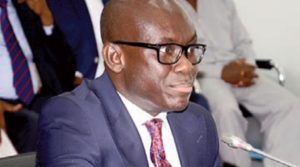Ghana’s Attorney-Generals says ICC needs reforms in its operations

The International Criminal Court (ICC) is celebrating its 20th anniversary with a call to debunk suggestions the Court is set-up to prosecute only African leaders.
In a statement by Mr Godfred Yeboah Dame, the Attorney General (AG) and Minister of Justice and copied the Ghana News Agency, he said while it was true that the Court was not established to prosecute only African leaders, there was the need for some reforms to be made in its operations.
Mr Odame was addressing an international conference in Dakar, Senegal, to commemorate the 20 years of the ICC’s establishment.
“These reforms essentially relate to the perception that the ICC was set up with the prime purpose of prosecuting only African leaders. For the Court to be a credible institution for the enforcement of international justice, the Court must pay attention to the call for some reforms in its operations” the AG said.
“The ICC is yet to effectively dispel the notion that its work is based solely on the consideration that the most serious crimes of concern to the entire international community must not go unpunished, and that, prosecution is not based on other considerations or motives.
“It is important in this regard, for powerful nations of the world to become members of the ICC, so as to banish the perception that the Court was set up to victimise Africans,” he added.
The AG and Minister of Justice, said Ghana was and would remain committed to the principles and work of the ICC, which existed primarily to fight impunity in the world.
He said Ghana was governed based on respect for human rights and thus had no difficulty at all in supporting the work of the ICC.
Mr Dame said Ghana’s unwavering support for the ICC was anchored on her own respect for the rule of law and respect for the fundamental human rights of all her citizens and humanity at large.
“The nation’s recognition and support for the work of the ICC are part of her cherished tradition and culture in the promotion and protection of international human rights and international courts set up with the object of consolidating such values.”
The Minister noted that: “Ghana was the 6th country to sign the Rome Statute. She was also one of the first countries to ratify the treaty when the Ghanaian Parliament voted unanimously for ratification of the treaty.”
He said Ghana had been steadfast in upholding the tents of the Rome statute, adding that Ghana was not one of the nations of the African Union, which voted to pass a non-binding resolution in Addis Ababa in January 2017, for a mass withdrawal from the ICC.
“Further, a prominent citizen of Ghana, Professor Akua Kuenyehia served as a judge of the ICC from 2003 to 2015 and was actually the 1st Vice-President for 6 years from 2003 to 2009.”
“We recently ensured the election of a prominent Justice of the Court of Appeal, Sir Dennis Adjei as a member of the Advisory Committee of the ICC, the body responsible for nominating judges of the ICC,” Mr Dame said.
He said Ghana’s political stability had seen the nation avoiding a “coup d’etat more than 40 years and the sustained practice of democracy under a written Constitution for the past 30 years,” and that, that had placed Ghana in a position where it could be said Ghana to have contributed and continued to contribute positively to the establishment of a world order devoid of impunity.
The situation in Ghana, the AG noted, was “dominated by respect for the basic norms of human rights and good governance.”
The conference served as a platform for strengthening cooperations between the Court and States Parties to devise means for a better fight against the impunity of serious and related crimes.
Opened by Mr Macky Sall, Senegalese’s President, the conference is expected to offer an opportunity to strengthen the capacities of national courts to complement the ICC’s quest for international justice.
The goals of the Dakar conference, which coincided with the anniversary, are to take stock of cooperation and complementarity initiatives between the ICC and States Parties to the Rome Statute within ECOWAS and beyond.
It is also to identify the efforts to be made and strategies to be adopted by ECOWAS Member States among other states in the region to become more effective in the fight against impunity of serious crimes as well as to reflect on the possibility of establishing a mechanism that will allow States Parties to prosecute serious crimes discovered by the ICC during its investigations that fall outside its authority.”
ICC was established to investigate, prosecute, and try perpetrators of mass crimes of concern to the international community.
The international criminal justice system dates to the Nuremberg and Tokyo military tribunals, which were set up at the end of the Second World War to try specific cases of international concern.
The resurgence around the World particularly in Yugoslavia, Rwanda, Liberia, of mass atrocities, which shocked the conscience of humanity, convinced the world to provide a permanent solution for the prosecution of international crimes to aid in the fight against impunity instead of the old ad hoc responses.
Against this background, on July 17, 1998, the international community adopted the Rome Statute – the founding treaty of the ICC, to provide for a permanent jurisdiction to prosecute crimes of genocide, crimes against humanity, war crimes and crimes of aggression.
Source: GNA
